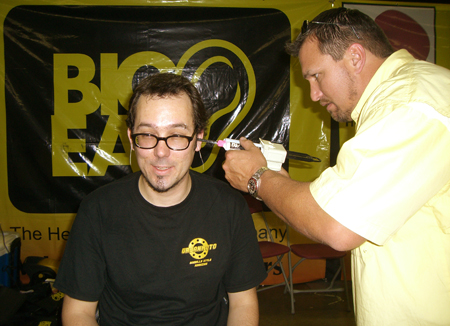Hello. I’m just blogging to tell you that I blogged. I’ll probably I tweeted about it too.
Here’s the article. It’s about a new thing that lets you crowdsource or be crowdsourced. It’s called AirRun and it’s an iPhone app.
Hello. I’m just blogging to tell you that I blogged. I’ll probably I tweeted about it too.
Here’s the article. It’s about a new thing that lets you crowdsource or be crowdsourced. It’s called AirRun and it’s an iPhone app.
![]() Yup! Another blog. This time about web apps. I review Dropbox on “The Best of the Cloud”
Yup! Another blog. This time about web apps. I review Dropbox on “The Best of the Cloud”
I wrote the whole thing in the cloud with my Cr-48.
Link to article here.
This is an article I wrote for Urban Moto Which came out February 2007. I give you my opinion of two different custom made ear-plugs and tell why you would want a pair.
Big Ear vs PlugUp – Custom Fit Ear Plugs
by Torrey Nommesen

Image from article. Photo by Jennifer Delk
 I don’t wear ear plugs around town, but I do when I go on long trips or out for a Sunday ride. I’ve been to San Diego from San Francisco a few times and one of the worst feelings is having an earplug slip. I’m on the highway and I’m in my groove. It’s just me, my bike, and the road. Then all of a sudden the wind whistles in one ear. Do I try to ignore it? Wiggle my head until the other plug falls out? Or do I pull over, take off my helmet, adjust my ear plug only to have it fall out again in another 20 miles down the road? Well, I’ve done all three, and all three options are a real pain in the ass.
I don’t wear ear plugs around town, but I do when I go on long trips or out for a Sunday ride. I’ve been to San Diego from San Francisco a few times and one of the worst feelings is having an earplug slip. I’m on the highway and I’m in my groove. It’s just me, my bike, and the road. Then all of a sudden the wind whistles in one ear. Do I try to ignore it? Wiggle my head until the other plug falls out? Or do I pull over, take off my helmet, adjust my ear plug only to have it fall out again in another 20 miles down the road? Well, I’ve done all three, and all three options are a real pain in the ass.
This is where an expensive pair of custom made earplugs shows its true value. You can usually find a booth at any motorcycle race in the vendors area or at a motorcycle show. They sit you down and squish this goo in your ear (it helps if you clean your ears before you sit down). The goo hardens a bit and they pull it out. The product is finished right there but you have to wait a little under half an hour.
I’ve been using a pair from PlugUp and I recently got a pair from Big Ear to see the difference. I went on a ride out to Drakes Beach. I used the Big Ear ones on the way up and the PlugUp ones on the way back.
The Big Ear plugs slipped out, so I had to pull over to adjust it. It took a bit to figure out how they were supposed to go in, but once I did, I was golden and they worked great the rest of the trip. Then when I took my helmet off, one of them slipped out and fell on the ground. I think I need a bit more practice with them.
The PlugUp ones worked fine and there was nothing to talk about other than they just worked.
They both cut down the noise of my engine and cut the wind noise of my helmet out (I wear a flip-up, so there’s lots of wind noise), but you can still hear horns and sirens. The Big Ear product seems to be a little softer than the PlugUp one and have less material. The PlugUp ear plugs have an extra bit that goes around the outside. This harder material with more to go around the ear ensures that they stay in place. The softer material of the Big Ear ones are a little more comfortable and they don’t show up as much when you take the helmet off.
I recommend getting a pair of custom made earplugs, they are totally worth the expense.
This is an article I wrote for Urban Moto Which came out January 2007. I give you my opinion of why it is better than owning a car, give you my reasons for using one, and then I take you through the general process. Afterwards I lists and compare the 3 car share options in San Francisco.
When Two Wheels Aren’t Enough
by Torrey Nommesen
I don’t need to convince you that motorcycles are great and cars suck. A car is an expensive albatross compared to a bike – gas, parking, insurance (everything but tires is cheaper for a bike). There are many other reasons why we ride, and you can read all about it in someone else’s article in this paper.
But sometimes, you need to pick up your baby sister from the airport, or it’s raining outside and your rain suit has a big hole in, or you’ve got some junk to take from point A to point B and you can’t fit it on a bike with one trip. So, what do you do if you need a car once in a while but you don’t want to own said piece-of-junk-with-a-trunk on four wheels? Do what I do, join a car time-share.
The main impetus for me to sign up for a car share was the point A to B thing. I rent a warehouse where the rent is cheap because it’s across the bay. I use this spot to brew beer and make art. I wouldn’t even have thought about getting that space if I didn’t have access to a car.
I use City CarShare. Tell ‘em Torrey from Urban Moto sent you and I get a little kick back. It is the only non-profit one in my area, so it gives me the warm fuzzies to use them. The 501(3)(c) means that the primary focus of the company is on providing a service to society, not necessarily the financial bottom line.
Here’s how it works with City CarShare, and the process is similar with the other companies:
You have to be at least 21. First, you sign up online with a credit card. You wait a few days as they check out your driving record and do a credit check to make sure you’re not a criminal and that you’ve actually got a license. Then you go through an orientation – either in person or online depending on the company.
To drive the cars, you go online or make a phone call with an automated system to reserve your car for as long as you want in 15 minute increments. You can almost always get a car when you need it, usually even at the last minute. You drive it, then return it to the same location that you picked it up. If the car you want isn’t near you, you can usually get one from another lot a few blocks down. Check the web sites before you join to see what lots are near you (City CarShare calls them ‘Pods’).
A card or key fob opens the car and keeps track of you so they can bill you, and your credit card gets billed monthly. The most I’ve ever paid is $375, but I usually pay about $50 a month.
You fill up the tank at a gas station with a card that’s in the glove box. Always remember to bring it back with more than half a tank, or you’ll get charged if the next driver complains. You get charged a fee if you run the car too late, a little more if you inconvenience another driver (but you can call the system to extend your reservation.) More fees if they catch you smoking in the car or if the car is especially dirty. They wash the cars, but if it gets too dirty you can get it cleaned and they’ll reimburse you. No pets (or at least without pet carriers).
They’ll reimburse you for a cab or come pick you up if the car dies. None of the cars are more than three years old, so this has never happened to me. If you get in an accident, there’s a little form in the glove box. You exchange insurance info with the other driver, call your company and they take care of the rest.
As with all of them, they have trucks if you need to haul a bunch of stuff, or you can get a small car that’s easy to park if you just need to pick up a few things. Best of all, if you don’t need the car, you don’t need to keep it around.
Below is an outline of the ones available in San Francisco.
 City CarShare
City CarShare
Plus: Warm fuzzy feeling (read above). The cheapest overall.
Minus: Only for the San Francisco area. You have to come up with $330 deposti up front. No pets (this may change).
Locations: San Francisco and East Bay
Founded: 2001 in San Francisco by a group of activists
Cars: Cooper MINI Convertible, Honda Civic Hybrid, Honda Element, Scion xA, Scion xB, Toyota Prius, Toyota Tacoma, VW Beetle
Cost:
$10/month + $4/hour + $.44/mile
$30 application fee
$300 security deposit*
*The deposit is refunded if/when you quit. You can add others to your plan to waive the $300, but you are responsible if they flake. Waived if you’re a UC Berkeley student
 Flex Car
Flex Car
Plus: Nationwide (because of partnership with I-Go).
Minus: it requires a lot of thinking to determine time vs miles to get the best possible rate.
Locations: throughout California and the West Coast including LA and San Diego, Portland (OR) and Seattl With a partnership with I-Go cars, you can use cars in Washington D.C., Atlanta and Chicago.
Founded: Seattle, WA in 1999 (they hit San Francisco in 2005)
Cars: (they list them only by type) Convertible, Hybrid Sedan, Minivan, Pickup Truck, Sports Car, Standard Sedan, Sub-Compact, Utility Vehicle, Wagon
Cost:
hourly or monthly
(San Francisco area, rates differ in different cities)
$25 – $35 application fee (depending on plan) + $50 annual fee
(depending on plan) +
$0 – $730/month depending on plan.
Higher monthly means more “free” hours. Similar to a cell phone plan where you buy a certain amount of hours per month and then pay extra if you go over the time limit.
Standard Plan $0/month + $9/hr
DriveFor5 Plan $25/month + $9/hr
Advantage 10 Plan $85/month up to 10 hours, $8.50 additional hours
Advantage 25 Plan $200/month up to 25 hours, $8.00 additional hours
Advantage 50 Plan $375/month up to 50 hours, $7.50 additional hours
Advantage 100 Plan $730/month up to 100 hours, $7.30 additional hours
 Zip Car
Zip Car
Plus: Nationwide plus Canada. The most variety of cars out of the bunch. They have a system where only your key will work with your reserved car, so someone else doesn’t accidentally take it. You can pay hourly or monthly, and they’ll automatically bill you the cheaper rate.
Minus: Not the cheapest option.
Locations: throughout North America including Toronto, Minneapolis, Chicago, New York, Boston, Washington DC, and Chapel Hill, NC.
Founded: Cambridge, MA 1999 (SF in 2005)
Cars: Over 20 makes and models including BMW, MINI Cooper, Volvo, Mazda, Pickup Trucks, SUVs and Prius Hybrids
Cost:
hourly or monthly, you pay the cheaper of the two.
Cars start at $8.75 per hour or $65 per day, and range to $12.75 per hour or $95 per day for premium vehicles
$25 – $50 per year depending on your plan
$25 application fee